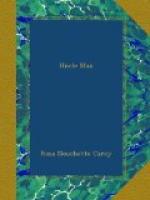We were standing together on the balcony, and as I spoke Jill stooped suddenly to look at a little flower-girl who was offering her wares on the pavement below. For a moment she did not answer. But I could see her cheek and even her little ear was flushed.
‘Oh yes, you will see him,’ she returned presently. ’What a little mite of a child! Look, Ursula. Please remember us to him, and—and we hope he is quite well.’ And Jill walked away from me rather abruptly, saying she must ask her mother for some pence. It was then that a doubt of Aunt Philippa’s policy crossed my mind; Jill was so different from other girls; and Lawrence Tudor had saved her life.
I had other things to occupy my mind just then,—a fresh anxiety that I could share with no one, and which effectually spoiled the last few days of my London visit.
The sight of Leah had somewhat disturbed me. It had brought back memories of the perplexities and mysteries of Gladwyn. Strange to say, I saw her again the very next day.
Mr. Tudor was calling at the door to inquire after Jill: he had his bag in his hand, and was on his way to the station. I was just going out to call on Lesbia, and we walked a few yards together. Just as I was bidding him good-bye, two women passed us: as I looked at them casually, I saw Leah’s flickering light-coloured eyes; she was looking in my direction, but, though I nodded to her, she did not appear to recognise me. The other woman was a stranger.
I was sitting alone on the balcony that afternoon. Aunt Philippa and Jill and Miss Gillespie were driving. I took advantage of their absence and the unusual quiet of the house to finish a book in which I was much interested.
I was very fond of this balcony seat: the awning protected me from the hot June sun, and the flower-boxes at my feet were sweet with mignonette. I could see without being seen, and the cool glimpses of the green Park were pleasant on this hot afternoon.
The adjoining house was unoccupied: it was therefore with feelings of discomfort that I heard the sound of workmen moving about the premises, and by and by the smell of fresh paint made me put down my book with suppressed annoyance.
A house-painter was standing very near me, painting the outside sashes of the window: he had his back turned to me, and was whistling to himself in the careless way peculiar to his class. It was a clear, sweet whistling, and I listened to it with pleasure.
A sudden noise in the street caused him to look round, and then he saw me, and stopped whistling.
Where had I seen that face? It seemed familiar to me. Of whom did that young house-painter remind me? Could I have seen him at St. Thomas’s Hospital? Was it some patient whose name I had forgotten during my year’s nursing? I had had more than one house-painter on my list.
I was tormented by the idea that I ought to recognise the face before me, and yet recognition eluded me. I felt baffled and perplexed by some subtile fancied resemblance. As for the young painter himself, he looked at me quietly for a moment, as though I were a stranger, touched his cap, and went on painting. When he had finished his job, he went inside, and I heard him whistling again as he moved about the empty room.




